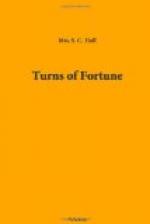Mr. Charles Adams was, as has been shown in our little narrative, a kind-hearted man. Estranged as his brother and himself had been for a number of years, he had done much to forward, and still more to protect, his children. At first, this was a pleasure; but somehow his “benevolence,” and “kindness,” and “generosity,” had been so talked about, so eulogised, and he had been so seriously inconvenienced by the waywardness of his nephews, the thoughtless pride of his sister-in-law, the helplessness of his younger nieces, as to feel seriously oppressed by his responsibility. And now the one who had never given him aught but pleasure, seemed, according to his daughter’s representations, to be the cause of increased sorrow, the destroyer of his dear child’s happiness. What to do he could not tell. His daughter, wrought upon by her own jealousy, had evinced, under its influence, so much temper she had never displayed before, that it seemed more than likely the cherished match would be broken off. His high-minded niece saved him any farther anxiety as far as she was concerned. She sent for and convinced him fully and entirely of her total freedom from the base design imputed to her. “Was it likely,” she said, “that I should reject the man I love lest I should drag him into poverty, and plunge at once with one I do not care for into the abyss I dread? This is the common sense view of the case; but there is yet another. Is it to be borne that I would seek to rob your child of her happiness? The supposition is an insult too gross to be endured. I will leave my mother to-morrow. An old school-fellow, older and more fortunate than myself, wished me to educate her little girl. I had one or two strong objections to living in her house; but the desire to be independent and away has overcome them.” She then, with many tears, entreated her uncle still to protect her mother; urged how she had been sorely tried; and communicated fears, she had reason to believe were too well founded, that her eldest brother, feeling the reverse more than he could bear, had deserted from his regiment.




